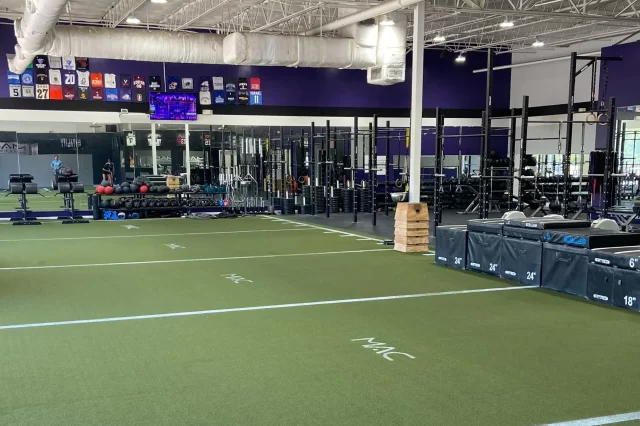Shannon Mulkey is a sports performance coach with over four years of experience leading training sessions at Mac Speed and Strength–a sports performance gym in Plano, Texas. Her programs are designed to enhance athletes' close-quarters agility, jumping ability, and full-body strength through sport-agnostic movements and drills, aiming to foster confidence and well-roundedness in each athlete as they prepare for competition. Having spent more than a decade as a student-athlete, including playing volleyball at the collegiate level, Shannon brings a personal understanding of young athletes' challenges and aspirations.
What are the most important elements of a well-rounded sports performance program, and how can athletic directors ensure their programs include these components?
Something I’ve seen success with is overall training athletes as athletes, and not just sticking to basic strength building. Including explosive, rotational and power movements helps athletes more in their sports since they’re actually working body movements that they would do on the court/field/etc. Training athletes to move like athletes is something that seems so simple–but it’s so important and often not implemented.
The most common issue I see with high school or even college athletic training programs (besides not having one) is a lack of intentional training. Sure, training the football team like bodybuilders will help them gain muscle, but training the football team like football players will help them become better athletes overall. When creating a fitness program, the knowledge and intention behind it will be the key to higher-performing athletes.
What is the difference between traditional speed and strength training versus sport-specific training? How do you tailor training programs to meet the specific needs of different sports?
Traditional training focuses on muscle-building in isolation, while sport-specific training hones in on the exact movements that athletes use in their sports. Athletes will be the most efficient and have the most success in their sport when they train for the different types of movements they’ll be making– they’ll be more explosive, jump higher and run faster. For example, athletes that participate in sports like baseball, softball or lacrosse use upper body and core rotation more than other sports, so including rotational exercises will not only help those athletes become stronger in movements specific to their sport but also will have that muscle memory there as well when replicating the movements in their sport. I recommend all high school and college athletes playing at or hoping to play at higher levels do more sports-specific training.
What role does in-season and off-season training play in athlete development and how can sports managers plan for this?
In-season training helps athletes maintain the strength and endurance they build in the off-season. By keeping up training in-season, athletes can stay at the level they worked to in the off-season and reduce chances of injury in-season. Off-season training gives athletes the ability to focus on areas they were weaker in during the season. By training in the off-season, athletes will come into their next season better than the previous, having maintained and improved from the last season, as well as be less likely to become injured going back into their sports. Sports managers can plan for this by implementing both in- and off-season workout programs, focusing more on maintenance during the in-season and focusing more on progress—getting faster and stronger—in the off-season.
Do you collaborate with coaches to align performance training with the team’s goals? How is this collaboration beneficial?
While I mainly work with individual athletes in private sessions, we do have cases where club or high school teams come into the gym for a group workout together. In these cases, I think it’s important to have that collaboration with the coach to learn where the team may be weaker, what might need improving, what the goals for the team are and how I can help in reaching those goals. In general, I think having the coaches present at strength training not only helps me do my job better, but it also can help coaches to see different sides of the same player.
How can sports training benefit athletes beyond physicality (i.e., Getting stronger, faster, etc.) are there any mental, social, or cultural impacts you have seen in your clients from training?
Sports performance training can definitely contribute to many positive mental and social qualities in athletes. Sports and training for said sports can help generate a strong mentality and help individuals develop discipline and routine. We see athletes completely open up and become stronger individuals with more confidence due to the time and effort put into improving themselves for their sport. Group training can also help athletes work better with others, as well as become better at encouraging and lifting up others around them.
How do you help create a high-performance culture within athletic teams, and how do you keep athletes motivated and engaged? What role can athletic directors play in fostering this across all sports programs?
We aim to create a culture where not only do trainers push their athletes, but also athletes learn to push themselves and others. One thing we rely on is baseline testing—we do this for agility movements like the vertical, as well as maxing lifts. By starting off with a baseline test, the athletes can see where their fitness level is currently, and we can work together to choose a goal for the next round of testing. I find that having a clear image of their fitness level and a clear goal set, athletes really begin to find motivation and push themselves even harder. Baseline testing also increases healthy competition among the team—where athletes are working to win against themselves and their teammates.
I would encourage all teams to train outside of just sports practice and implement well-thought-out, sports-specific training programs for each team. It is important for any athletics program to focus on more than just strength, when it comes to fitness, and to hire sports performance coaches who train athletes specifically. Having a fitness program with intent and thought behind it is crucial in creating high-performing and competitive athletes.




